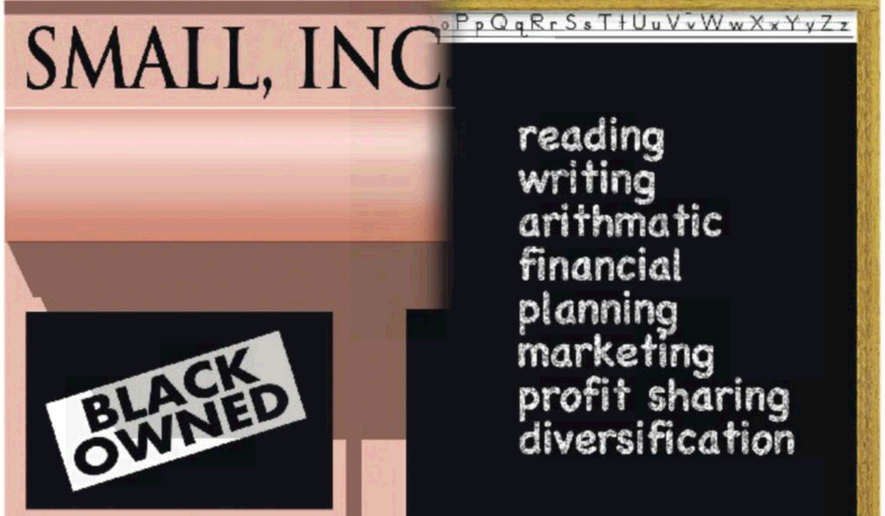OPINION:
According to the Small Business Administration, most small business owners in this country are over the age of 55. Other research shows that 57% are over the age of 60.
Now imagine that you’re a Black business owner.
Using these averages would mean that the average Black small business owner was born sometime in the early to mid-1960s. In my hometown of Philadelphia — as in many other cities — there were race riots, segregation and public racism. Our mayor in the 1970s encouraged residents to “vote white.”
In Palo Alto, California, a 1971 study found that Black people experienced discrimination in 50% of apartment complexes, while a 1976 investigation in suburban Baltimore uncovered discrimination in more than 45% of cases. Black people didn’t just have fewer opportunities than white people then. They had a lot of fewer opportunities.
Fifty years later, those same people are now among the majority running businesses. Unfortunately, there’s not a lot of them, and they’re not running them as well as their white counterparts.
Progress has been made. But according to the Census Bureau, Black people comprise approximately 14.2% of the U.S. population. Yet, Black businesses comprise only 2.2% of the nation’s 5.7 million employer businesses (firms with more than one employee). Currently, Black businesses bring in average revenues of $1,031,021, compared to $6,485,334 for non-Black businesses. Black businesses create an average of 10 jobs per firm, compared to 23 for non-Black businesses. Black people in Philadelphia make up 41% of the city’s population yet own only 6% of the city’s businesses.
I could throw out more data about how far behind Black-owned businesses are. Still, Andre M. Perry and Carl Romer do a better job than me in this great piece they wrote last year for the Brookings Institution, where they implore more people to invest in Black businesses.
But is it just money that Black business owners need?
Money certainly helps. Thanks to centuries of discrimination, the data shows that Black people have significantly less household wealth and significantly less capital than white people. Thanks to centuries of racism, they still meet significant obstacles procuring bank loans and financial advice (83% of financial advisors and 91% of accountants are non-Black, according to one recent study).
In the wake of the 2020 protests, big companies from Wells Fargo and Facebook to Visa and Verizon have been literally throwing money at Black and minority-owned businesses in their attempt to make up for past sins. The government has set aside billions in funding for minority-owned businesses as part of its stimulus, grant and minority assistance programs.
So no, I don’t think it’s just the lack of money that’s keeping Black-owned businesses from doing better. It’s simpler: It’s education. That’s because you can give all the money in the world to an entrepreneur. But if they don’t know how to use it, it’s wasted.
That 50- or 60-year-old Black business owner grew up in a world where educational opportunities were either unavailable or not affordable in a way that their white counterparts enjoyed. The situation is slowly improving. But even today, there’s a clear gap in literacy rates among Black children across the country compared to white children. Only 18% of African American fourth-graders were proficient in reading and only 19% scored as proficient in math, according to an analysis by the U.S. Chamber of Commerce Foundation.
The national college graduation rate for Black students stands at 42%, which is 20% points below the 62% rate for white students.
This is the simple reason why Black-owned businesses aren’t as successful as White-owned businesses.
Many Black business owners need to learn how to read and do math better.
They need to better understand finance, marketing, technology, operations and employee management. They need to comprehend a balance sheet, prepare a forecast and calculate ROI, just as many white business owners have been taught. They need to present their business plan to a banker with the same level of confidence as the white business owner who graduated from college or has business training. They need a network of other business owners and professionals to lean on for questions and advice, just like many of my white clients and I do.
If corporate America really wants to help Black businesses succeed — and I truly believe it does — it needs to stop throwing money at them and instead provide knowledge and relationships. Its investments need to be diverted into programs that teach Black entrepreneurs the business management skills they need to run a business.
That means sending their employees — or hiring professionals — to teach these skills at community colleges and local business groups and organizations. They should open up their professional communities to more Black communities where those business owners can seek guidance. It’s not about writing a check. It’s about transferring knowledge.
Sure, the money is helpful. But it’s not the answer. And frankly, it’s a lazy way for companies to say they “care” about minorities. A better way to show how much they care is to show those same business owners how to use that money to build a sustainable, valuable enterprise.
• Gene Marks is a CPA and owner of The Marks Group, a technology and financial management consulting firm that specializes in small- and medium-sized companies.




Please read our comment policy before commenting.